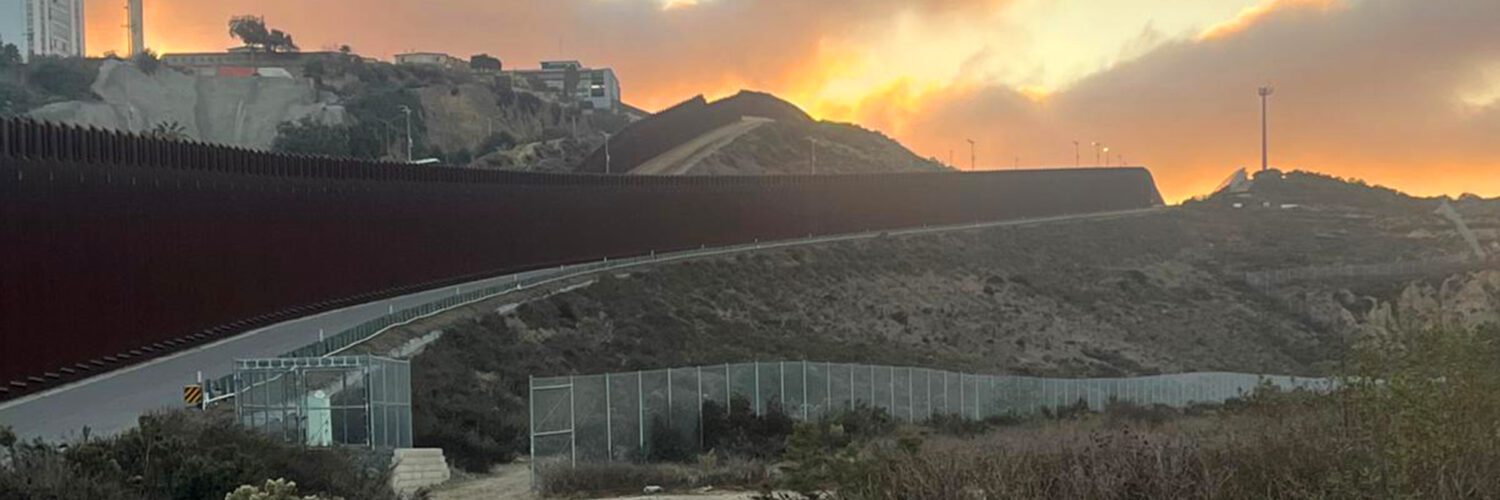
Bearing Witness: A Journey to the US/Mexico Border
San Ysidro is the busiest border crossing in the Western Hemisphere. Every day, tens of thousands cross from Mexico to San Diego, but for those without documentation and fleeing violence or persecution, the journey is far from straightforward.
In December, I had the opportunity to join a Jewish delegation border trip to Tijuana and San Diego, led by HIAS. Being there in person, seeing the realities on the ground, and hearing directly from those impacted, I realized how much I did not know about our immigration system. One of the most striking experiences was seeing the two massive border walls–one on the U.S. side and one on the Mexico side–designed at a height of 30 feet, which studies determined to be the most daunting for people to scale. Yet, despite these obstacles, we saw two young mothers with small children and five young men surrendering to border agents in the space between the walls (unofficially called No Man’s Land), risking everything in pursuit of safety.
Inside Otay Mesa Detention Facility–classified as “minimum/medium security”–we walked through electric gates and security checkpoints. The facility holds 1,600 people from Mexico, Venezuela, Russia, Georgia, and beyond. A control center monitors every movement 24/7. There are about 750 staff members, almost two per detainee. Detainees must purchase phone minutes, have no assigned legal representation, and face a system designed for their removal. Walking the halls, we saw cages (sealed rooms) housing dozens of humans. The officers we met referred to them as being in “removal proceedings” and described asylum as a last-resort legal defense, rather than what we know it to be—a fundamental human right.
Without legal counsel or a forensic psychological exam, both of which are incredibly hard to attain, asylum seekers have only a 3% chance of being granted asylum. That number jumps to 80% for those fortunate enough to obtain both. Bearing witness to these realities was deeply humanizing and heartbreaking. The people I met were not abstract policy debates but real lives in limbo, shaped by a system designed to deter rather than support.
When I visited in December, the new presidential administration had not yet taken office. On the day of Trump’s inauguration, the primary legal pathway for seeking asylum through the CBP One app—flawed even when accessible—was shut down, canceling appointments and leaving thousands in limbo. Since then, there have been hundreds of executive orders and proclamations targeting immigrants, asylum seekers, and refugees. As HIAS marks its 7th Annual Refugee Shabbat, I reflect on how much has changed in just one year and how these new policies will reshape immigration in unimaginable ways.
We cannot afford to look away. Jewish text and tradition reminds us that “we, too, were strangers in a strange land,” and calls on us time and time again to use our own history of displacement, migration, and being “othered” to stand in solidarity with those who are displaced or seeking refuge.
What struck me most was the sheer arbitrariness of it all—who gets detained, who gets released, who gets sent back. Luck, geography, and bureaucratic decisions determine a person’s fate. I thought about the families we work with in New York, who survived this journey only to face new challenges—finding housing, securing work, accessing education—all while processing the trauma of their migration. Their resilience in building a new life is extraordinary, but they should not have had to endure such hardship to find safety and dignity in a country that claims to be a refuge.
As we continue our work, we must not only support these families but also push for a system that upholds justice, humanity, and refuge. The families we support through our programs at BJ and throughout our city are not statistics; they are people who have faced impossible choices and unimaginable obstacles. As we advocate for their rights and assist in their transition, we must also bear witness, share their stories, and demand a system that truly offers dignity and justice.
Shabbat shalom,

Kiana Davis

